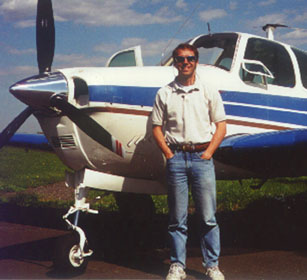
 |
|||
|
Recurrent Training Article
We all forget things: The value of recurrent training By Ron Zasadzinski A few years ago, I took a six-month break from flying. When I returned, my first flight was to take my mom flying in Southern California. I learned to fly there, but this flight was originating from an unfamiliar airport, and my planned route was into marginally familiar territory skirting some Class C airspace (then an ARSA). I thought my planning was reasonable, having drawn a course-line on the sectional, written down the headings I would be flying and frequencies I would need. I decided not to get flight-following or talk to approach control as I hadn't done it in a while and besides, I wanted to be able to talk to my passengers. Not long into the flight the landmarks didn't look quite right and I soon figured out I was inside the Class C airspace I was hoping to avoid. How did that happen?! I turned to fly out of it quickly, but was embarrassed and nervous. I didn't get into trouble, but I had made a mistake: I forgot all about magnetic variation. In that part of the world variation is 14 degrees East, and so my carefully planned course to graze the edge of Class C actually took me on a shallow path right into it. Presently, I am a full-time flight instructor and fly at least five days out of every seven. Most people would say I am as current as a pilot can be. Last month I took two weeks off from my usual routine, though I did fly some for pleasure. My first day back I called for a weather briefing to fly from Fort Collins to Cheyenne. I gave them the information I thought I needed to. When I finished, the briefer asked for my tail number! How funny, I had forgotten to give it to him at the beginning! I also forgot to bring the paperwork I fill out for each student every time I instruct. The point of these two stories is obvious; we all forget things. This usually starts with details that may not be crucial (giving a briefer your tail number, paperwork), progresses to details that are important (magnetic variation), and eventually to crucial safety issues like emergency procedures and comfort during stressful events like landing in gusty crosswinds. Forgetting those details can take as little as just a week or two of non-flying time. Sure, we don't forget how to fly the plane. But what if something goes wrong? Are we really prepared when the unexpected presents itself? This is why recurrent training is so important. An experienced flight instructor can not only make sure bad habits are being addressed, but can show you some new techniques for maneuvers you already know how to do, and can show you some new maneuvers too. There is so much to know about flying, no one was taught everything during their training for any rating. We all have more to learn. Recurrent training makes us safer, in fact a lot safer. It is also fun to be doing and learning new things. And it doesn't have to be expensive. Reading magazines, attending safety seminars, or getting a group of pilot-friends together for a tour a nearby control tower costs very little. Flying with a CFI is also important, and the amount of time you spend can be tailored to your individual budget. There are many, many avenues to keep learning more about flying. For a list of some things you might try, read farther down this web page. I have flown with hundreds of pilots of all skill levels. What makes the best ones who they are is a desire to learn new things, a recognition that regular practice and recurrent training are necessary, and just enough perfectionism to want to get it right. |
| [top] |
|
Recurrent Training Ideas
One of my strongest desires as an instructor is to have a pilot come to me and say, "Ron, I want to be a better pilot. If I were to fly with you for five (or some other number) flights, what could you teach me to make me as good a pilot as I can be?" I would taylor this type of specialized and advanced training to the particular pilot. Some core ideas I would suggest include: understanding and perfecting emergency procedures, mastering the short field landing, and getting comfortable communicating with air traffic control including flying to and from control towered airports, and requesting flight following from approach control or center. If you are interested in this kind of recurrent/advanced training, please contact me.
There are many other avenues for learning more! If you want additional information about any ideas above, contact me for details. If you have other ideas that should be on the list, please email them to me. |